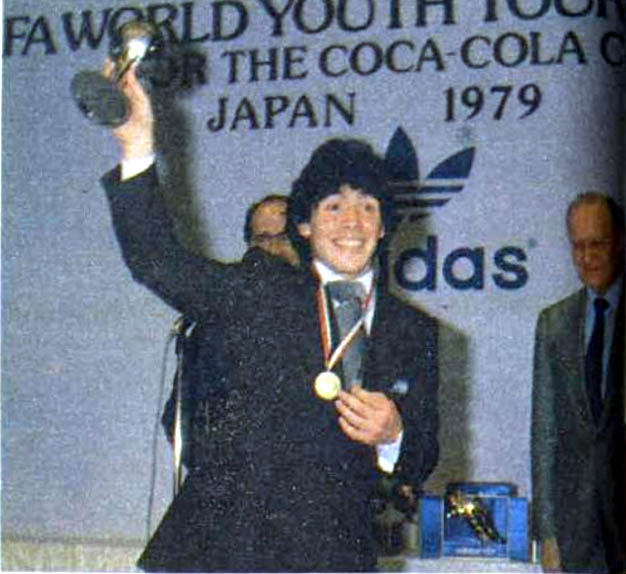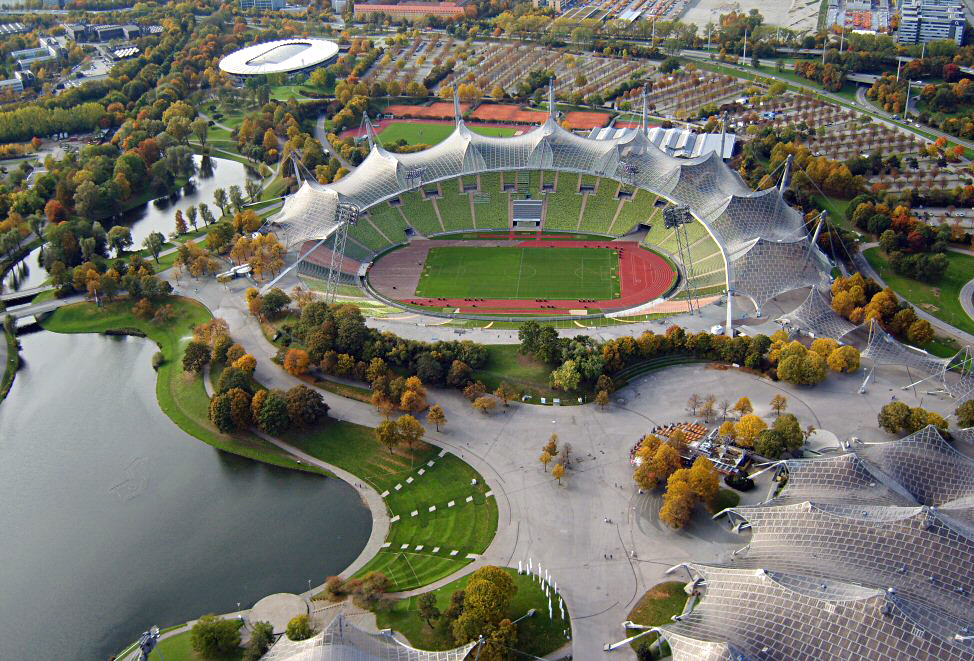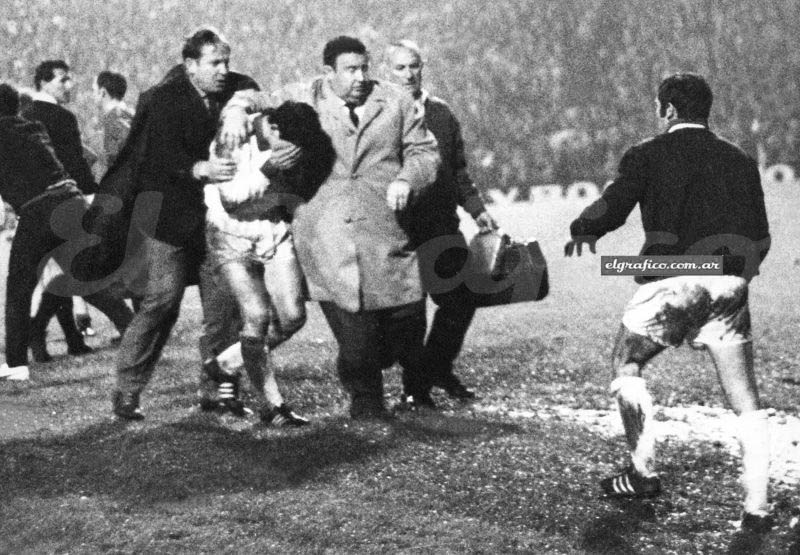|
Zé Beto
José Alberto Teixeira Ferreirinha (21 February 1960 – 4 February 1990), known as Zé Beto, was a Portuguese footballer who played as a goalkeeper. He played almost his entire career at FC Porto, his life being cut short at 29 in a road accident. Club career Born in Matosinhos, Zé Beto arrived at FC Porto at the age of 17, making his Primeira Liga debut two years later on loan to S.C. Beira-Mar. After three more seasons as a backup, he was made first-choice for the 1983–84 campaign. Zé Beto was the starter when Porto lost 2–1 against Juventus F.C. in the final of the 1983–84 European Cup Winners' Cup, in controversial manner: losing his temper, the player assaulted the assistant referee with his own flag, being suspended by UEFA for a period of two years. In the following seasons, Zé Beto kept an interesting battle for first-choice status with Pole Józef Młynarczyk (signed in January 1986), eventually losing his position and being further demoted after the ... [...More Info...] [...Related Items...] OR: [Wikipedia] [Google] [Baidu] |
Matosinhos
Matosinhos, Porto, Portugal () is a city and a municipality in the northern Porto district of Portugal, bordered in the south by the city of Porto (8 km from the city centre). The population in 2011 was 175,478, and covered an area of approximately . The urban centre, the city proper, had a population of 45,703 in 2001. History The oldest vestige of human settlement in this territory extend back thousands of years and include instruments and Paleolithic artefacts, collected along the old beaches (specifically Boa Nova and Almeiriga). The settlement of the land began sometime 5000 years ago, during the Neolithic, as evidenced from various funeral monuments and dolmens sporadically situated in Lavra, Perafita, Leça do Balio, Santa Cruz do Bispo, Guifões and São Gens. At the end of the Bronze Age, much like most of the northwest peninsula, settlements expanded into proto-urban agglomerations at high altitudes ( castros), associated with a culture with specific character ... [...More Info...] [...Related Items...] OR: [Wikipedia] [Google] [Baidu] |
Józef Młynarczyk
Józef Młynarczyk (born 20 September 1953) is a Polish former professional footballer who played as a goalkeeper. After representing three clubs in his homeland he played out the remainder of his career in France and Portugal, winning seven major titles with Porto during his one-and-a-half-season spell. Młynarczyk played more 40 times with Poland, appearing in two World Cups with the country. Club career Born in Nowa Sól, Młynarczyk arrived at Widzew Łódź in 1980 aged 27, after playing for three modest clubs. During his four-year spell, in which he was equally first and second-choice, the team won two Ekstraklasa titles, finishing second in the other two. In the 1982–83 European Cup, he helped Widzew to the semifinals after edging Liverpool in the last-eight (4–3 on aggregate). In 1984, aged 31, Młynarczyk signed with SC Bastia in France. In January 1986 he switched countries again, joining FC Porto from Portugal, where he won the European Cup, the Intercontinent ... [...More Info...] [...Related Items...] OR: [Wikipedia] [Google] [Baidu] |
Japan
Japan ( ja, 日本, or , and formally , ''Nihonkoku'') is an island country in East Asia. It is situated in the northwest Pacific Ocean, and is bordered on the west by the Sea of Japan, while extending from the Sea of Okhotsk in the north toward the East China Sea, Philippine Sea, and Taiwan in the south. Japan is a part of the Ring of Fire, and spans Japanese archipelago, an archipelago of List of islands of Japan, 6852 islands covering ; the five main islands are Hokkaido, Honshu (the "mainland"), Shikoku, Kyushu, and Okinawa Island, Okinawa. Tokyo is the Capital of Japan, nation's capital and largest city, followed by Yokohama, Osaka, Nagoya, Sapporo, Fukuoka, Kobe, and Kyoto. Japan is the List of countries and dependencies by population, eleventh most populous country in the world, as well as one of the List of countries and dependencies by population density, most densely populated and Urbanization by country, urbanized. About three-fourths of Geography of Japan, the c ... [...More Info...] [...Related Items...] OR: [Wikipedia] [Google] [Baidu] |
1979 FIFA World Youth Championship
The 1979 FIFA World Youth Championship, the second staging of the FIFA World Youth Championship, was held in Japan from 26 August to 7 September 1979. It was the first FIFA tournament played in Asia. The tournament took place in four cities — Kobe, Omiya, Tokyo and Yokohama — where a total of 32 matches were played, four more than in the previous edition due to the addition of a quarterfinal round in the knockout stage. Argentina won the trophy after beating holders Soviet Union 3–1, in a final held at Tokyo's National Stadium. Argentina fielded an attack-minded high-scoring team, averaging 3.33 goals per game. They were led by the powerful duo of Diego Maradona and Ramón Díaz, who were the tournament's best player and top scorer respectively. Between the two of them, they scored 14 of Argentina's 20 goals (70%). Qualification :1.Teams that made their debut. Squads For a list of all squads that played in the final tournament, see ''1979 FIFA World Youth Champion ... [...More Info...] [...Related Items...] OR: [Wikipedia] [Google] [Baidu] |
UEFA Euro 1988 Qualifying
This page describes the qualifying procedure for UEFA Euro 1988. Qualified teams Seedings Summary Tiebreakers If two or more teams finished level on points after completion of the group matches, the following tie-breakers were used to determine the final ranking: # Greater number of points in all group matches # Goal difference in all group matches # Greater number of goals scored in all group matches # Drawing of lots Groups The qualifying draw took place on 14 February 1986, in Frankfurt. West Germany qualified automatically as hosts of the competition. 32 teams entered the draw. The qualifiers, consisting of 32 teams divided into seven groups; three of four teams and four of five teams, were played in 1986 and 1987. Each group winner progressed to the finals. Group 1 Group 2 Group 3 Group 4 Group 5 Group 6 Group 7 Goalscorers Notes References External links UEFA Euro 1988at UEFA.com {{DEFAULTSORT:Uefa Euro 1988 Qualifying Quali ... [...More Info...] [...Related Items...] OR: [Wikipedia] [Google] [Baidu] |
UEFA Euro 1988
The 1988 UEFA European Football Championship final tournament was held in West Germany from 10 to 25 June 1988. It was the eighth UEFA European Championship, which is held every four years and supported by UEFA. The tournament crowned Netherlands national football team, the Netherlands as European champions for the first time. Euro 88 was a rare instance of a major football tournament ending without a single sending-off or goalless draw, nor any knockout matches going to extra time or penalties. Euro 1988 was the final European Championship to see West Germany national football team, West Germany and the Soviet Union national football team, Soviet Union teams, as the West and East Germans German reunification, reunified to become Germany in 1990, the Soviet Union Dissolution of the Soviet Union, disintegrated into 15 separate countries in 1991. Bid process West Germany won the right to host the tournament with five votes ahead of a joint bid from Norway, Sweden and Denmark, whic ... [...More Info...] [...Related Items...] OR: [Wikipedia] [Google] [Baidu] |
Sweden National Football Team
The Sweden national football team ( sv, svenska fotbollslandslaget) represents Sweden in men's international football and it is controlled by the Swedish Football Association, the governing body of football in Sweden. Sweden's home ground is Friends Arena in Solna and the team is coached by Janne Andersson. From 1945 to late 1950s, they were considered one of the greatest teams in Europe. Sweden has made twelve appearances at the World Cup with their first coming in 1934. They have also made six appearances at the European Championship. Sweden finished second at the 1958 FIFA World Cup, which they hosted, and third in both 1950 and 1994. Sweden's other accomplishments also include a gold medal at the 1948 Summer Olympics, and bronze medals in 1924 and 1952. They also reached the semi-finals at UEFA Euro 1992, also while hosting. History Sweden has traditionally been a strong team in international football, with 12 World Cup appearances and 3 medals in the Olympics. The ... [...More Info...] [...Related Items...] OR: [Wikipedia] [Google] [Baidu] |
Cap (sport)
In sport, a cap is a player's appearance in a game at international level. The term dates from the practice in the United Kingdom of awarding a cap to every player in an international match of rugby football and association football. In the early days of football, the concept of each team wearing a set of matching shirts had not been universally adopted, so each side would distinguish itself from the other by wearing a specific sort of cap. An early illustration of the first international football match between Scotland and England in 1872 shows the Scottish players wearing cowls, and the English wearing a variety of school caps. The practice was first approved on 10 May 1886 for association football after a proposal made by N. Lane Jackson , founder of the Corinthians: The act of awarding a cap is now international and is applied to other sports. Although in some sports physical caps may not now always be given (whether at all or for each appearance) the term ''cap'' for a ... [...More Info...] [...Related Items...] OR: [Wikipedia] [Google] [Baidu] |
1986 FIFA World Cup
The 1986 FIFA World Cup was the 13th FIFA World Cup, a quadrennial football tournament for men's senior national teams. It was played in Mexico from 31 May to 29 June 1986. The tournament was the second to feature a 24-team format. Colombia had been originally chosen to host the competition by FIFA but, largely due to economic reasons, was not able to do so, and resigned in 1982. Mexico was selected as the new host in May 1983, and became the first country to host the World Cup more than once, after previously hosting in 1970. The World Cup was won by Argentina (their second title, after winning in 1978). Argentina was captained by the 25-year-old Diego Maradona, who played a large part in his team's success by scoring his " Hand of God" goal, as well as another voted "Goal of the Century", in the same quarter-final against England. These were two of the five goals that Maradona scored during the tournament, and he also created another five for his teammates. Argentina beat ... [...More Info...] [...Related Items...] OR: [Wikipedia] [Google] [Baidu] |
Saltillo Affair
The Saltillo Affair ( pt, O Caso Saltilho) was a series of controversies surrounding the Portuguese national football team during its participation in the Mexico '86 FIFA World Cup. The affair was named after the Mexican city of Saltillo, Coahuila, in which the team was headquartered for the competition, and also the place where the majority of the described events occurred. The team had qualified for only one previous World Cup tournament, in 1966, in which it finished third. Following a difficult qualification, the 1986 campaign did not start well with the suspicion of doping falling on one of the players who had been selected for the tournament. Although that test was later proven wrong, that was the first of many controversies to affect the team in the following weeks, including threats of strikes from the players, the announcement of a series of demands to the Portuguese Federation and reports of inappropriate behaviour at the team's headquarters. It was one of the bigge ... [...More Info...] [...Related Items...] OR: [Wikipedia] [Google] [Baidu] |
Intercontinental Cup (football)
The European/South American Cup, more commonly known as the Intercontinental Cup and from 1980 to 2004 as the Toyota European/South American Cup (abbreviated as Toyota Cup) for sponsorship reasons, was an international association football, football competition endorsed by UEFA (Europe) and CONMEBOL (South America), contested between representative clubs from these confederations (representatives of most developed continents in the football world), usually the winners of the UEFA Champions League and the South American Copa Libertadores. It ran from 1960 to 2004, when it was succeeded by the FIFA Club World Cup, FIFA Club World Championship, although they both ran concurrently in 2000. From its formation in 1960 to 1979, the competition was as a two-legged tie, with a playoff if necessary until 1968, and Penalty kick (association football), penalty kicks later. During the 1970s, European participation in the Intercontinental Cup became a running question due to controversial eve ... [...More Info...] [...Related Items...] OR: [Wikipedia] [Google] [Baidu] |
UEFA Champions League
The UEFA Champions League (abbreviated as UCL, or sometimes, UEFA CL) is an annual club football competition organised by the Union of European Football Associations (UEFA) and contested by top-division European clubs, deciding the competition winners through a round robin group stage to qualify for a double-legged knockout format, and a single leg final. It is one of the most prestigious football tournaments in the world and the most prestigious club competition in European football, played by the national league champions (and, for some nations, one or more runners-up) of their national associations. Introduced in 1955 as the ( French for European Champion Clubs' Cup), and commonly known as the European Cup, it was initially a straight knockout tournament open only to the champions of Europe's domestic leagues, with its winner reckoned as the European club champion. The competition took on its current name in 1992, adding a round-robin group stage in 1991 and allowing mul ... [...More Info...] [...Related Items...] OR: [Wikipedia] [Google] [Baidu] |
.jpg)





.png)